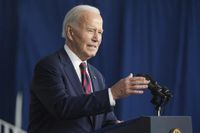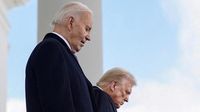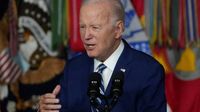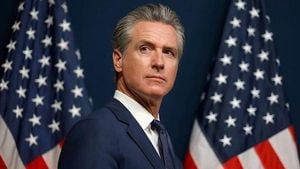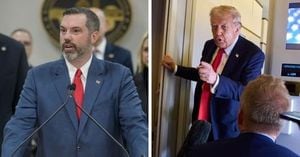Former U.S. President Joe Biden has sharply criticized the Ukraine policy of his successor, Donald Trump, labeling it as a "modern appeasement policy" in a recent interview with the BBC. This interview, which aired on May 7, 2025, marked Biden's first public comments since leaving office in January. During the discussion, Biden expressed confusion over how some people believe that a dictator would be satisfied by allowing him to seize important territories that do not belong to him. He stated, "I just don’t understand how people can think that a dictator, a rogue, will be satisfied if we allow him to appropriate important territories that don’t belong to him."
In the interview, recorded on May 5, Biden referenced the historical context of appeasement, drawing parallels to British Prime Minister Neville Chamberlain's attempts to placate Adolf Hitler in the late 1930s. He warned that Trump's approach could lead to a loss of confidence in American leadership among European allies. "I fear that our allies around the world will begin to doubt whether we will stay where we have always been for the past 80 years," Biden remarked, highlighting the potential erosion of trust in U.S. commitments.
Biden was particularly critical of Trump's recent calls for a ceasefire in Ukraine, suggesting that such a move would not satisfy Russian President Vladimir Putin. "Anyone who thinks that Putin will stop if Kyiv gives up territory is simply crazy," Biden asserted. He emphasized that Putin believes he has a historical right to Ukraine and that ceding territory would not quell his ambitions. "What the hell is going on here? What president talks like that? That’s not who we are. We’re about freedom, democracy, and opportunity, not about confiscation," he added.
The former president's criticisms extended to Trump's handling of international relations, particularly regarding NATO. Biden expressed dismay at the contempt shown by the Trump administration towards NATO and its allies, stating, "I don’t understand how they can’t grasp that there is strength in alliances, that they bring advantages, and the costs are outweighed." He warned that if NATO were to break apart, it would fundamentally alter the modern history of the world.
Reflecting on a tense moment during Trump's presidency, Biden recalled an incident when Ukrainian President Volodymyr Zelensky clashed with Trump and Vice President JD Vance in the Oval Office. Biden described that scene as "beneath America’s dignity," indicating his belief that such interactions undermine the United States’ reputation on the global stage.
Moreover, Biden took issue with Trump's comments regarding potential U.S. control over territories like the Panama Canal, Greenland, and Canada. "What kind of president talks like that?" he questioned rhetorically, reiterating that such statements do not reflect American values. "We stand for freedom, democracy, opportunity, not for confiscation," he insisted.
As Biden continues to reflect on his presidency and the current political landscape, he dismissed criticisms regarding his decision not to step aside earlier for Kamala Harris during the 2024 election cycle. "I don’t think it would have made a difference," he stated, acknowledging the complexities of political timing and leadership transitions.
In light of these discussions, Biden's comments resonate strongly with the ongoing debates about U.S. foreign policy and its implications for global security. His stark warnings about appeasement echo historical lessons learned from the past, suggesting that yielding to aggressive powers may lead to greater conflict rather than peace.
The term "appeasement" itself has a heavy historical connotation, often associated with the failures of France and Great Britain to confront Nazi Germany in the 1930s. As Biden pointed out, the hope that concessions would prevent war proved misguided, and he cautioned against repeating those mistakes in today's geopolitical climate.
Biden's interview serves not only as a critique of Trump but also as a call to action for American leadership on the world stage. He stressed the importance of maintaining strong alliances and reaffirming commitments to democratic values and international cooperation.
As the global landscape continues to evolve, the implications of these discussions will likely shape U.S. foreign policy for years to come. The ongoing conflict in Ukraine remains a focal point for international relations, and Biden's insights reflect a broader concern about the future of democracy and stability in the face of authoritarian aggression.
In conclusion, Biden's assessment of Trump's Ukraine policy as modern appeasement raises critical questions about the effectiveness of diplomatic strategies in dealing with aggressive regimes. His reflections on the importance of alliances and the dangers of underestimating adversaries highlight the need for a robust and principled approach to foreign policy.
